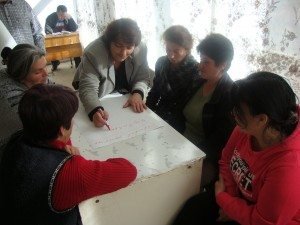On Jan. 1, a new law on “Social Assistance to Border Communities” went into effect in Armenia. The measure provides partial subsidies on natural gas, electricity, and irrigation to those living in Armenia’s volatile border regions.

However, not all of the country’s borderland communities will be assisted by the law; only 31 are mentioned in the government’s approved list.
“We applied to the Ministry of Territorial Administration and they said only those areas that are under heavy shelling will be considered,” said Nune Avagyan, a council member in the village of Gomk. “Never mind that such incidents also occur here. They are just not as publicized.”
Gomk is a southern Armenian village located just 6 kilometers from the Azerbaijani border. The community is made up mostly of refugees from Baku who fled during the Karabagh War. Forced to leave their homes and belongings behind, they resettled in Gomk and began working to rebuild their lives from scratch.
The dilapidated infrastructure and remoteness of the village has presented countless difficulties and obstacles for the resettling population. But they have not waited for handouts to get back on their feet.
In 2012, with the support of Oxfam in Armenia, local residents came together to establish a women’s agricultural cooperative. After months of mobilization, community forums, and planning meetings, a core group of about 30 women founded the cooperative. They received consultation and training from Oxfam on everything from crop cultivation techniques to marketing and accounting. By their second year, they had a 400 m2 greenhouse and cold storage facility up and running.
“When we first began promoting the idea of a cooperative, people looked at us like dreamers,” said Avagyan. “But over time, we showed that we can address our own issues. We made residents believe in a brighter future.”

Gomk’s favorable climate gives it huge potential for agricultural production. The cooperative has succeeded in cultivating quality crops such as green beans, cucumbers, tomatoes, eggplants, and various fruits. Buyers have been quick to purchase from the enterprise given its premium product and affordable pricing. Today, nearly 40 households in the community have been provided a livelihood through the cooperative. And they can barely keep up with demand.
“They have no problem selling their crops,” said Vadim Uzunyan, the economic justice program manager at Oxfam. “If anything, the issue is upgrading and expanding production to keep up with demand.”
Decisions in the co-op are made democratically and the profit is distributed equally to all members. A portion of the proceeds is also allocated to social initiatives within the community itself. For example, in 2013, the cooperative donated a TV and DVD player for the local kindergarten. They also helped the local school with textbook purchases last year. The goal is to not only benefit individual members but the village as a whole. As such, it is not just a business, it is a social enterprise geared toward uplifting the broader community.
“When people unite around a common mission,” Avagyan said, “they can create institutions that benefit the masses. Such farmers’ cooperatives are the only thing that can bring small-scale producers together to advance a collective cause.”
The all-female cooperative has also empowered its members to become leaders in the community. In 2013, given her visible role in the cooperative’s formation and success, Avagyan was elected as a member of the local village council. Today, she actively promotes Gomk in the public arena and works to attract greater development and recognition for the community.
In many ways, the story of Gomk encapsulates the not-so-subtle changes being seen in Armenia over the past several years. Despite gaining independence in 1991, war, blockades, natural disaster, and economic collapse stifled Armenia’s growth for a good part of the last two decades. Significant social shifts and economic innovation are slowly trickling within the country.
Unlike other areas throughout the world, which have literally centuries of experience with cooperatives and other alternative economic models, Armenia has been implementing such strategies only recently. The potential for growth and sustainable development through such measures has yet to be fully realized.
This potential includes a higher level of cooperation with the diaspora, as well. Members of the co-op are keen to invite Armenians from abroad into the community to directly engage in their efforts. They are currently seeking to purchase a mini-tractor to streamline their operations with the help of supporters in the diaspora.
“We are always thankful and encouraged by their support,” Avagyan said. “When we see that they care about Armenia and want to stand by our side—despite being so far away—it inspires faith and hope within us all. Just that care alone is enough to fuel us.”
Whether or not the village is eventually incorporated into the new law on border assistance, the residents of Gomk are determined to build a brighter future for their community. And despite having lost everything once in their lives before, they have not lost their faith and do not plan on turning back now.
As Avagyan explained, “I am an optimistic person, as are the majority of residents here. I have hope that one day our village will become like a mini-Switzerland: a beautiful, clean, and pleasant place to live.”
Those interested in lending a hand to the cooperative in their current drive to purchase a mini-tractor can make a secure online donation by visiting donate.oxfam.org.uk/armenia.


World’s most advanced industrious countries, started from an healthy farming and better agricultural system. This is what Armenia needs the most!